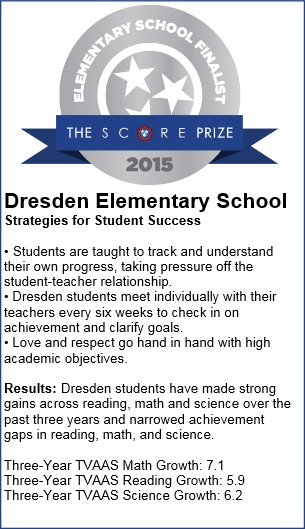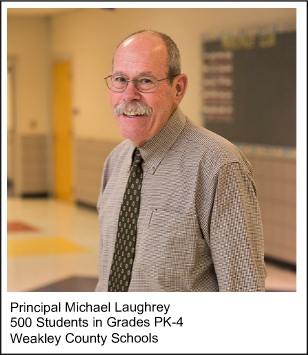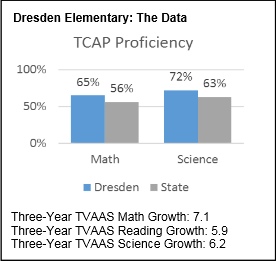 They’re called parent-teacher conferences. But for Dresden Elementary fourth-graders, a more accurate term might be student-parent-teacher conferences.
They’re called parent-teacher conferences. But for Dresden Elementary fourth-graders, a more accurate term might be student-parent-teacher conferences.
When teachers at 2015 SCORE Prize finalist school Dresden Elementary meet with parents twice each year, the student involved is always present and at the center of the conversation, said fourth-grade teacher Honey Cantrell.
“It’s more of a student-led conference,” said Ms. Cantrell. “They know where they are. They can articulate their goals.”
 At Dresden, students thoroughly understand what is expected of them. Kids are taught to articulate the details of academic goals and performance. Students can see for themselves the sources of educator concerns, allowing kids and teachers to forge close relationships and work together as a team.
At Dresden, students thoroughly understand what is expected of them. Kids are taught to articulate the details of academic goals and performance. Students can see for themselves the sources of educator concerns, allowing kids and teachers to forge close relationships and work together as a team.
The results are remarkable. Dresden, which won the 2014 SCORE Prize, has made strong gains across reading, math, and science over the past three years and narrowed achievement gaps in reading, math, and science. Instruction is highly differentiated across the school, and a Response to Instruction and Intervention (RTI2) process involving all students ensures that each child receives exactly what they need. Each child is treated as an individual, personally and academically.
“Dresden Elementary’s success has been primarily caused by the relationships we have with our students,” said Principal Mike Laughrey. “They just feel like they’re welcome.”
Dresden is a Title I school, where 80 percent of students receive free and reduced meals.
Student body demographics have no bearing on the school’s expectations for achievement, though resources are planned and student needs are met accordingly.
“For the majority of the children who some to Dresden Elementary, this is the best part of their day,” said Mr. Laughrey. “The faculty takes that very seriously.”
Students are treated with love, care, and respect. And the relationship is mutual – students have many opportunities to contribute to the school, benefiting everyone involved. Dresden has a Citizen of the Month program, as well as a Citizen of the Year program incorporating volunteer hours for fourth-graders. Third-graders help work the school’s car line, opening doors and welcoming kids to school each morning.
“We recognize children for good behavior and effort,” said Mr. Laughrey. “It’s key to academic performance. They have bought into it.”
A critical component of student-teacher relationships at Dresden is clear communication of objectives and individualized instruction. The comprehensive RTI2 process ensures instructors don’t get so caught up in the struggles of some students that others are neglected, and it also provides additional challenges for kids who would benefit.
Third- and fourth-grade students use personal data binders to track academic goals and progress. RTI2 assessments, benchmarks, weekly progress, graphs, and reports are all included. So are student goals, which pupils are taught to articulate and document themselves. Younger students participate on a smaller scale with data folders.
Students meet one-on-one with their teachers every six weeks to check in on progress and clarify objectives. Teachers have the opportunity to make sure that goals – and planned steps forward – are clear and reasonable.
“The student conferences with my teacher have really helped me this year,” said fourth-grade student Gillian Melton. “I know what she expects me to do and we make a plan to reach the goal.”
For Ms. Cantrell, the conferences and binders hold students accountable for their own progress, taking some pressure off the student-teacher relationship and allowing kids and educators to work as a team. The binders make it clear to students that progress is being made, showing growth and demonstrating capabilities. Close tracking of individual progress also informs Ms. Cantrell’s instruction and ensures that she recognizes each student as an individual.
“I know the student, and the student knows that I know them,” said Ms. Cantrell. “I know the areas that they need to improve. I know their strengths. I know their weaknesses. It helps me know them at such an individual level that I’m better equipped to help them with their weak areas.”
When report cards are sent home, they’re sent home in the binder – all stakeholders see the same information and results. Twice each year, before report cards are out, parent-teacher conferences are held with the binders as a centerpiece. Students lead the discussion, writing down goals and what they can do to fulfill them. Parents bring home a list of actions they can take to help.
Fourth-grade student Tanner Thomas appreciates being able to show his parents the full scope of his work.
“I love the student data binder,” said Tanner. “I get to see how I am really doing, and I love showing my parents all of my growth and progress.”
 “I know my strengths and weaknesses. I can make new goals for myself that I know I can achieve,” added fourth-grader Kaci Finney.
“I know my strengths and weaknesses. I can make new goals for myself that I know I can achieve,” added fourth-grader Kaci Finney.
At Dresden, close relationships with students and high expectations go hand in hand. There’s a sense of camaraderie in classrooms, Ms. Cantrell says. Kids are happy and excited about learning, unafraid to ask questions.
“There’s no doubt that we care about them. Everyone knows that their teacher loves them. It’s a family. It’s a community,” Ms. Cantrell said. “If we seem to be hard on them at times, they know that it’s out of love. We won’t let them not succeed.”
Sometimes that means taking a pie in the face a few times each year. Mr. Laughrey says that’s part of the job description for elementary principals.
“They have to see me not only as their principal, but also someone who’s willing to do those kinds of things,” said Mr. Laughrey. “Elementary kids want to have fun. A sterile environment doesn’t produce much. A child will do more for a teacher they like.”
